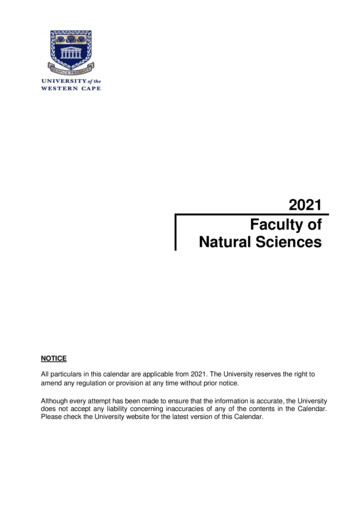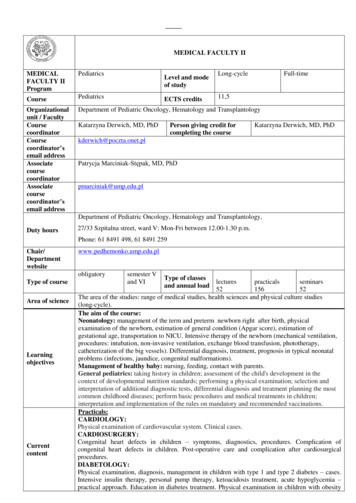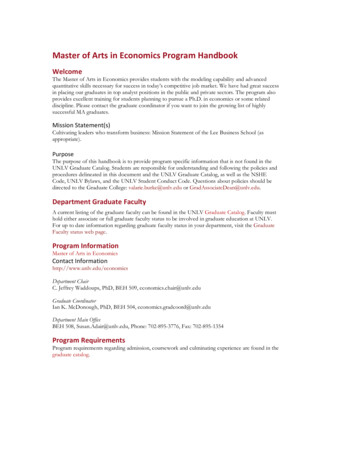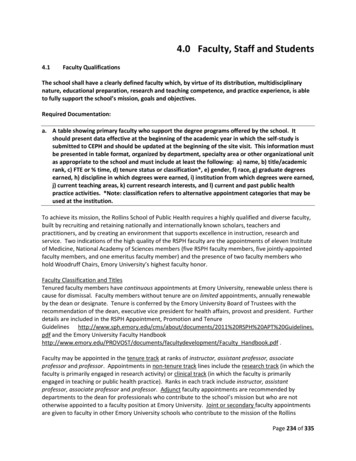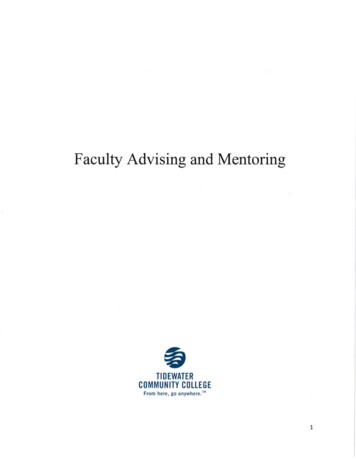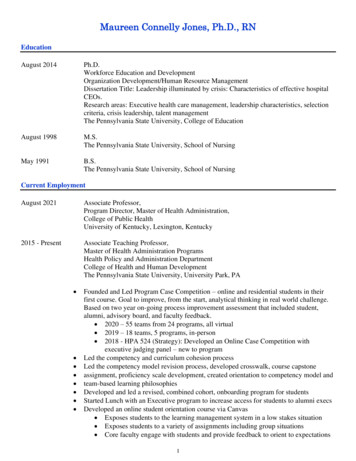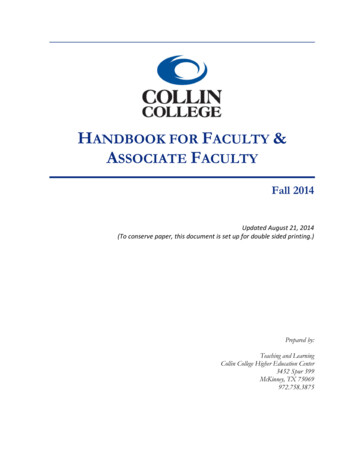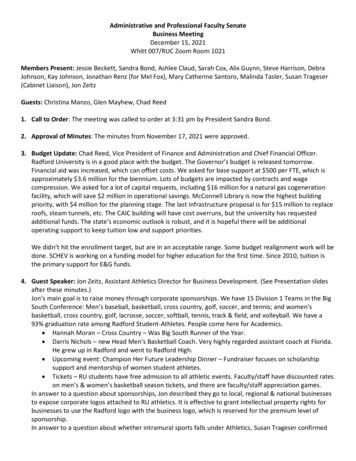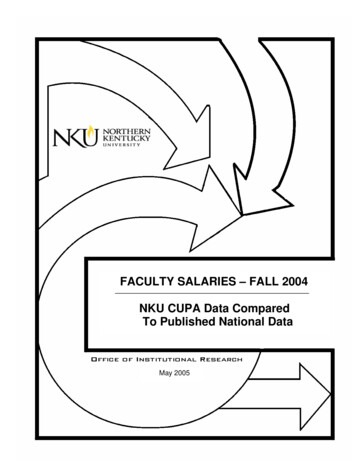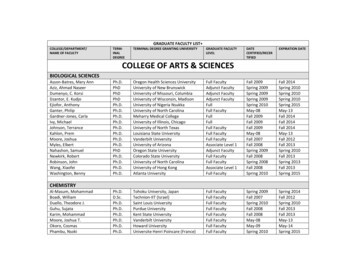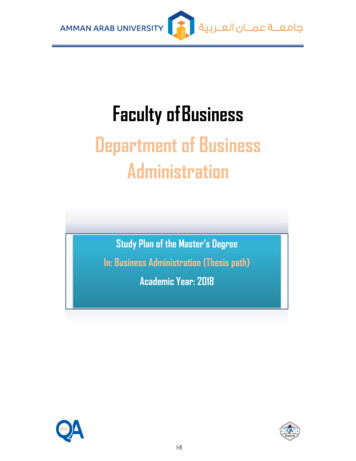
Transcription
Faculty of BusinessDepartment of BusinessAdministrationStudy Plan of the Master’s DegreeIn: Business Administration (Thesis path)Academic Year: 20181-9
Vision of the Department:Building students capabilities in business administration, developing their knowledge andleadership skills.Mission of the Department:To create distinguished students with basic knowledge, skills and abilities in businessadministration.Objectives of the Department:1. Develop the knowledge of graduates in the field of business administration, and the generalknowledge he needs in the field of work.2. Update the students’ knowledge in the sciences related to business administration.3. Graduates of distinguished students with scientific and applied skills in business administrationaccording to the requirements of the labor market locally and regionally.4. Develop students' skills and ability to analyze, link and use technology in business administration.5. Developing students' skills and abilities to diagnose problems and use statistical and quantitativemethods in decision-making.6. Develop students' skills and abilities in interaction and communication with others, team work,analysis, creative thinking, problem solving and self-developing7. Develop students' skills and abilities in the preparation of sound scientific research in the fieldof business administration.8. Raise students' awareness to adapt to environmental changes, professional and ethical valuesin business organizations.Intended Learning Outcomes (ILOs):a. Knowledge:1. Knowledge in the field of business: Knowledge acquired through the compulsory and electiverequirements.2. Knowledge in the field of business administration: Knowledge acquired by students in the fieldof specialization.B. SkillsAnalytical skills: the ability of the graduate to identify the fundamental variables in thedifferent positions in business organizations, how to deal with them.1. Diagnostic skills skill: diagnosing the causes of problems in business organizationsand ways to solve them.2. Cognitive skills: The intellectual ability to accommodate cause-and-effectrelationships and to visualize the overall way in which the parts of businessorganizations are interconnected.2-9
3. Interactive skills: interaction skills and communication with others, and motivatethem to perform better.4. Research skills: Skills acquired by the student through the writing of reports andscientific research through various sources: such as traditional sources as books,references, periodicals, electronic sources such as the Internet and electronicdatabases, and field sources such as questionnaires and interviews.5. Professional and ethical attitudes and values: The values, tendencies and trendsacquired by the student through his knowledge of the values, ethics and behaviorof the profession, which he should have after his graduation through practicing theprofession in the labor market such as professionalism, transparency, diversity,teamwork, leadership and risk acceptance, creativity, innovation, flexibility andadaptation.C. Competencies:1. Self-development agendas: through flexible thinking and focus on achievement andmanagement of resources for the organization and leadership teams within them2. Competence related to responsibility and independence: the ability to adapt to theobjectives of the organization and to have strategic thinking and the ability to plan3. Competence related to the roles that will be played within the organization: Negotiation,attention to clients, diplomacy, organizational knowledge and influence on other3-9
FrameworkFramework of the Master's Degree in marketing ( 33 Cr. Hrs.)SequenceClassification1stCompulsory RequirementsCredit Hours15Percent %46%2ndElective Requirements927%3rdThesis927%33%100TotalCourse NumberingSequenceCourse LevelCognitive Domain27Dept. CodeFaculty CodeBABusinessCognitive DomainsNumberCognitive DomainCredit Hours1Quantitative Methods , Scientific Research Management& related subjects122Human resources subjects123Thesis91. Compulsory Requirements: (15) credit hours are as follows:Article NoArticle NameCreditsPrerequisite20172011Scientific Research Methodology3-20271011Strategic Management3-20373011Managerial Accounting3-20472011Marketing Management3-20571022Advanced Financial Management3-4-9
2 . Elective Courses: (9) credit hours are as follows:Article No.Article NameCreditsPrerequisite20171011Business Ethics3-20174021Entrepreneurship and Small BusinessManagementInternational Business ManagementChange ManagementAdvanced Organization Theory3-333-Operations ManagementProject ManagementE- ManagementFundamentals of Human 720222027202320273021207710111.3: Thesis: (9) credit hours distributed as follows:Article No.Article esis620177000Course DescriptionScientific Research Methodology(20172011)(3 credit hours)The course covers the study and analysis of the concept and terminology of scientificresearch and its role in supporting the administrative decisions in business organizations.It deals with all aspects and stages of the process of scientific research includingdetermination of the problem, defining the variables, the choosing the research design,developing hypotheses, collection of data, develop a plan of inspection, collection andanalysis of data, testing hypotheses and writing the final report. The course deals withdescriptive statistics including organization of data, measures of central tendency anddispersion, correlation and regression. The course covers distributions like Normal, t andF in addition to sampling and sampling distributions. Testing hypotheses about the meanof a population, the difference between two means, Analysis of variance and regressionwill be covered using SPSS.5-9
Strategic Management(20271011)(3 credit hours)This course aims to provide students with how to build a strategic management framework,which includes environmental scanning and strategy formulation, implementation, andevaluation. It also aims to provide students with the skills, knowledge, and tools for theanalysis and selection of strategic alternatives and implementation it according to thesurrounding environment variables in large, small entrepreneurial business, and non-profitorganizations.Operations Management(20272022)(3 credit hours)This course is designed to identify the most important applications of quantitative modelsfor production and operations management. The course contains multiple concepts andtopics in operations management, such as total quality management, and just-in-timeproduction, inventory management, project management, forecasting, and everythingrelated to the organization activities in terms of operations to participate in success ofdecision-making process.E- Management(20273021)(3 credit hours)This course provides an overview of e-management and e-management Functions, andintroduces the fundamental concepts and frameworks of e-business and e-government, theprevalent enabling technologies, and the strategic issues confronting the legacy firms. Theefficiency, performance, capacity, and practical design of e-management systems will becovered with the best practice.Managerial Accounting (20373011)(3 credit hours)This subject includes and how to use financial information to account for and control costs,and make various administrative decisions. It covers selected topics in cost accounting(such as process costing and order costing, ABC, and assigning actual, estimates andstandard costs to activities) and topics in management accounting (such as budgeting inshort and long terms, and the use of BCS , it includes also how to calculate the optimalcapital structure and ways of studying alternatives for decision making , feasibility studies,using advanced soft wares as a starting point to help making relevant decisions andapplying sensitivity and scenarios analyses.Marketing Management (20472011)(3 credit hours)This course aims to study advanced marketing management and all its stations and axeswith providing students with skills related to how the application of administrativefunctions in marketing activities, and the skill of marketing planning, organization,coordination and marketing guidance and command and control, and implementation of6-9
marketing activities, and the process of making marketing decisions and finally control andaudit catalog and characteristics of global marketing manager.Advanced Financial Management (20571022)(3 credit hours)Gain an understanding of corporate financing and investing strategy as opposed tooperational finance. Integrate your understanding of corporate finance, accounting,economic analysis, risk assessment and investments, and greatly enhance your competencein executing corporate financial strategy. Examine the issues pertaining to corporationfinance from the standpoint of corporate executives, shareholders and corporate advisors.Using current best practices in financial tools and techniques, perform a series ofsimulations based on actual corporate finance deals and projects. These simulations exposeyou to critical corporate finance issues and solutions and provide practical, hands-onexperience in dealing with situations in valuation, capital structure, investment allocation,dividend policy, mergers and acquisitions, real options, and ethicsFundamentals of Human Resource Management (20771011)(3 credit hours)This course covers the fundamentals of human resource management, and concept ofhuman resources functions such as; planning, job analysis and descriptions, recruitment,training and development, compensation, workers’ rights and human resource accountingand performance appraisal. In addition to career development. The course clarify legalissues related to equal opportunity, as well as the main features of human resourcemanagement in the era of globalization, and practical issues in human resourcemanagement.Business Ethics (20171011)(3 credit hours)The course includes the concept and importance of managing ethical Behavior inbusiness; clarify factors associated with business ethics in organization functions, andworkers' rights and fair treatment in the organization. As well as maintaining the privacyof workers. These objectives are achieved and content by discussing several case studiesthat aim to highlight the practical aspects of this courseEntrepreneurship and Small Business Management (20174021) (3 credit hours)This course aims to provide students with a sound base understanding to concepts ofentrepreneurship, the characteristics and skills of entrepreneurs and their role in activatingtheir businesses. As well as identifying, critical issues affecting entrepreneurship and smallbusiness in Jordan. This course offers students desiring to start, own, or operate a smallbusiness, the opportunities to develop abilities, understanding, and critical thinking skillsnecessary for developing, managing and growing an entrepreneurial venture. The course7-9
focuses on all the key aspects of entrepreneurial success, from successful idea generation,development to successfully launching a firm. It introduces the requirements necessary toinitiate a small business, and identifies the elements comprising a business plan. Thiscourse also focuses on the mastery of skills needed to plan, organize, manage, and financea small business and preparing a comprehensive business plan for starting a small business.Taking into consideration Jordanian context.International Business Management (20174022)(3 credit hours)This course teaches students to analyze the key factors determining competitiveness indifferent economies and make appropriate strategic recommendations. Students will learnhow to interpret the complex system of rules covering international business organizationsand construct models and frameworks dealing with different circumstances. Studies aredivided into three main sections – the global business, the evolution of internationalindustries, and global business strategy.Change Management(20271022)(3 credit hours)Course presents an overview of the fundamental components of organization change anddevelopment. Case studies are discussed and analyzed to close the gap between theory andpractice. Practical skills and approaches are studied, such as change techniques andstrategies, influence methods in dealing with leaders and consulting/ learning models.Focus of course helps students implement successful change programs in theirorganization. Topics of discussion include developing sponsorship, action researchmethods, survey feedback approaches and dealing with conflict and resistant to changeAdvanced Organization Theory(20271023)(3 credit hours)The course includes basic concepts of organization theory, and its objectives, clarify thetraditional and modern designs in organization theory, analyze the components oforganization design and underlying its principles, measure organizational performance,determine the concept of organizational environment and its components and types,organization development and decline techniques, quality culture, building and designingorganizational structures and basic challenges of organizational design, enhance theorganization effectiveness through management information systems, and theorganization's relationship with its environment, international relations, organizationalconflict, innovation, change, and organizational development in the 21st centuryProject Management (20272023)(3 credit hours)Project management has become central industries as diverse as construction andinformation technology, architecture and hospitality, and engineering and new product8-9
development, therefore this topic simultaneously embrace the general principles of PM,management of technology, people skills, culture, stakeholders, and other diverse elementsnecessary to successfully complete a project.9-9
To create distinguished students with basic knowledge, skills and abilities in business administration. Objectives of the Department: 1. Develop the knowledge of graduates in the field of business administration, and the general knowledge he needs in the field of work. 2.
